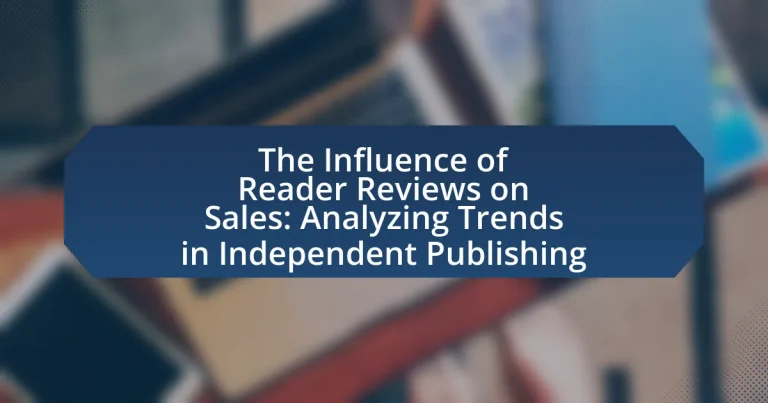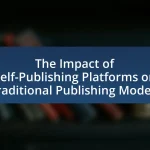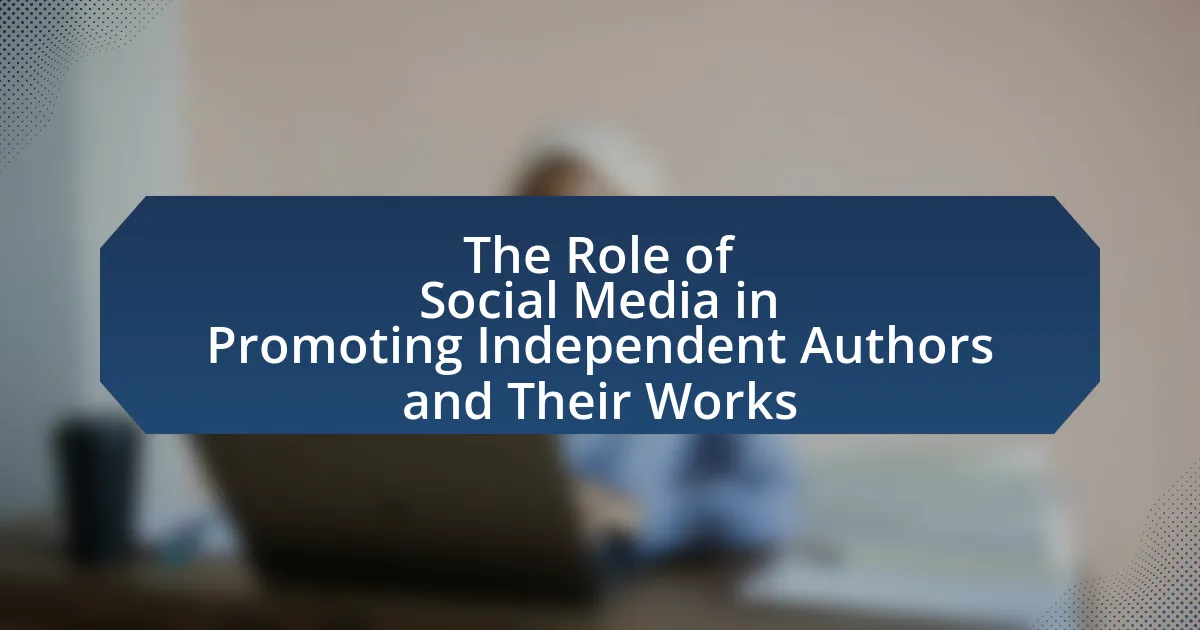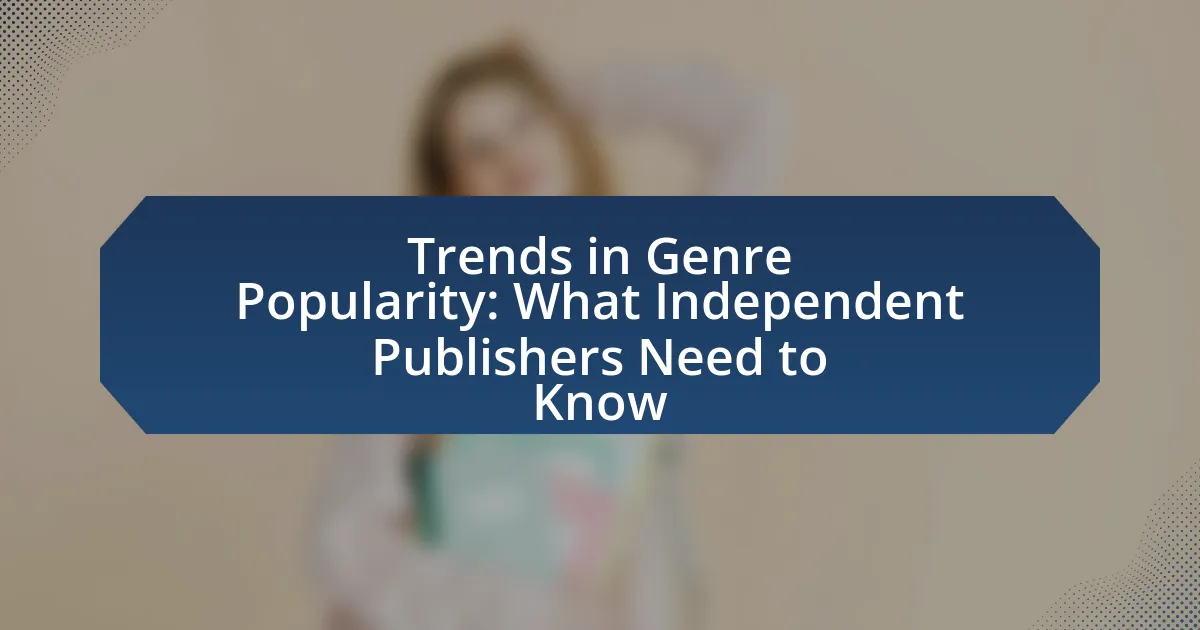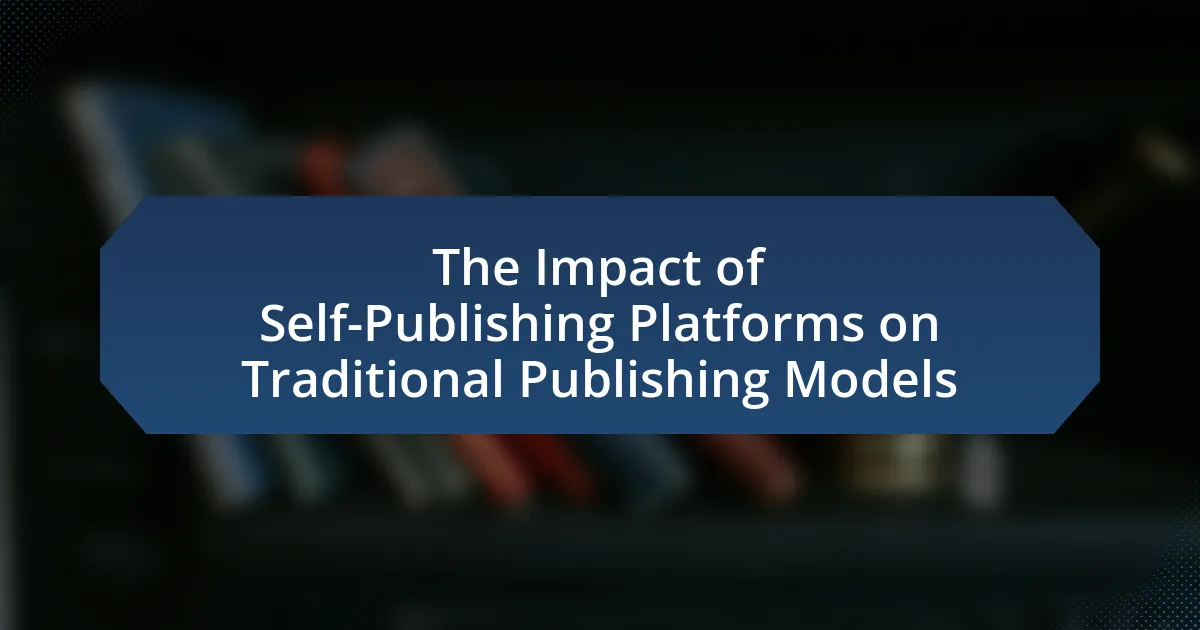The article examines the significant influence of reader reviews on sales within the independent publishing sector. It highlights how positive reviews enhance visibility and credibility, leading to increased consumer trust and higher sales figures. Statistical evidence supports the correlation between review ratings and sales performance, with research indicating that both positive and negative reviews can dramatically affect purchasing decisions. Additionally, the article discusses emerging trends in reader review behavior, the impact of social media, and effective strategies for independent authors to leverage reviews to boost their sales.
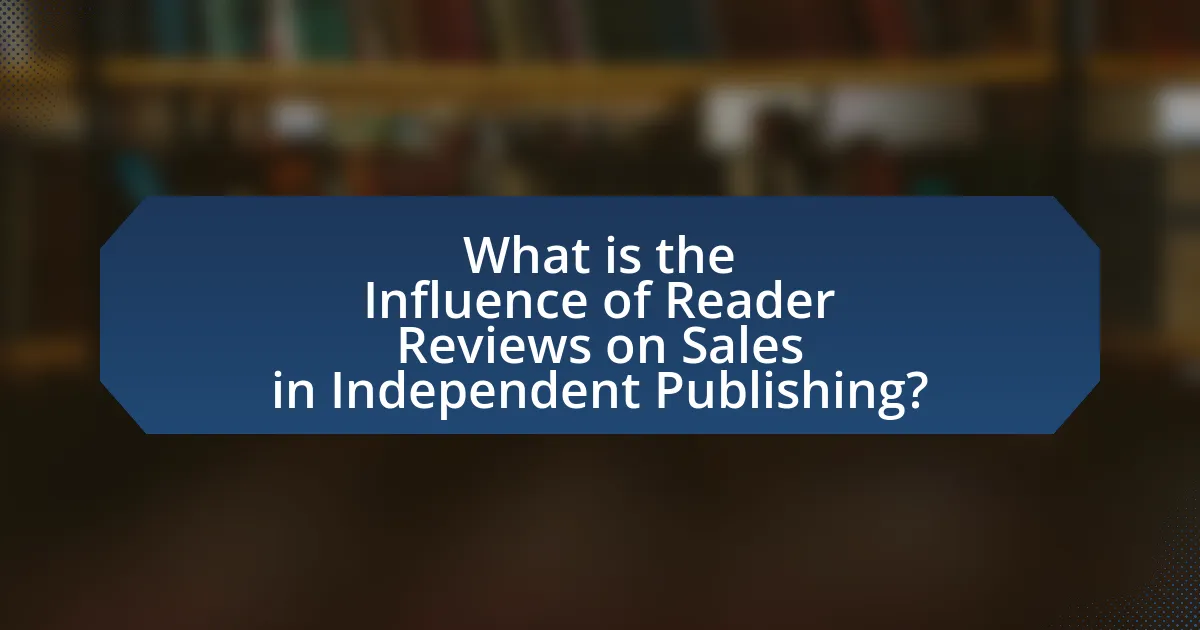
What is the Influence of Reader Reviews on Sales in Independent Publishing?
Reader reviews significantly influence sales in independent publishing by enhancing visibility and credibility. Positive reviews can lead to increased consumer trust, which directly correlates with higher sales figures. Research indicates that books with higher ratings and more reviews tend to rank better in online marketplaces, thereby attracting more potential buyers. For instance, a study published in the Journal of Business Research found that a one-star increase in ratings can lead to a 10-15% increase in sales. This demonstrates that reader feedback not only impacts individual purchasing decisions but also shapes overall market trends in independent publishing.
How do reader reviews impact sales figures for independent authors?
Reader reviews significantly impact sales figures for independent authors by influencing potential buyers’ perceptions and decisions. Positive reviews enhance credibility and attract more readers, while negative reviews can deter purchases. A study by BrightLocal found that 91% of consumers read online reviews, and 84% trust them as much as personal recommendations. This demonstrates that reader reviews serve as a critical factor in shaping the purchasing behavior of consumers, directly affecting the sales performance of independent authors.
What statistical evidence supports the correlation between reader reviews and sales?
Statistical evidence indicates a strong correlation between reader reviews and sales, with numerous studies demonstrating that higher ratings lead to increased sales volume. For instance, a study by Chevalier and Goolsbee (2003) found that a one-star increase in a book’s average rating on Amazon can lead to a 20% increase in sales. Additionally, research published in the Journal of Marketing Research shows that products with more reviews tend to sell better, as they provide social proof and enhance consumer trust. This correlation is further supported by data from Nielsen, which reveals that 70% of consumers trust online reviews as much as personal recommendations, directly impacting purchasing decisions.
How do positive and negative reviews differently affect sales outcomes?
Positive reviews significantly enhance sales outcomes by increasing consumer trust and encouraging purchases, while negative reviews tend to deter potential buyers and decrease sales. Research indicates that products with higher ratings can see sales increases of up to 18% compared to those with lower ratings. Conversely, a single negative review can lead to a 22% decrease in sales, as consumers often prioritize the opinions of others when making purchasing decisions. This dynamic illustrates the critical role that both types of reviews play in shaping consumer behavior and influencing overall sales performance in independent publishing.
Why are reader reviews crucial for independent publishing?
Reader reviews are crucial for independent publishing because they significantly influence potential buyers’ purchasing decisions. In a market where independent authors often lack the marketing budgets of traditional publishers, authentic reader feedback serves as a vital form of social proof. Research indicates that 70% of consumers trust online reviews as much as personal recommendations, highlighting the importance of reader reviews in establishing credibility and attracting new readers. Furthermore, positive reviews can enhance visibility on platforms like Amazon, where algorithms favor books with higher ratings and more reviews, ultimately driving sales and increasing an author’s reach.
What role do reader reviews play in building an author’s reputation?
Reader reviews significantly contribute to building an author’s reputation by providing social proof and influencing potential readers’ perceptions. Positive reviews enhance credibility and trust, as studies show that 79% of consumers trust online reviews as much as personal recommendations. Additionally, a high volume of favorable reviews can lead to increased visibility on platforms like Amazon, where algorithms favor books with better ratings, further solidifying an author’s standing in the market. This correlation between reader feedback and author reputation underscores the importance of engaging with readers and fostering a positive review culture.
How do reviews influence consumer purchasing decisions in independent publishing?
Reviews significantly influence consumer purchasing decisions in independent publishing by shaping perceptions of quality and credibility. Positive reviews enhance a book’s visibility and desirability, leading to increased sales; for instance, a study by the Pew Research Center found that 70% of readers are influenced by online reviews when selecting books. Conversely, negative reviews can deter potential buyers, as consumers often rely on the experiences of others to gauge the value of a product. This reliance on reviews is particularly pronounced in independent publishing, where authors lack the marketing budgets of traditional publishers, making reader feedback crucial for establishing trust and driving sales.
What trends are emerging in reader reviews and their impact on sales?
Emerging trends in reader reviews indicate that authenticity and engagement significantly influence sales. Recent studies show that consumers increasingly prefer genuine reviews over those that appear overly polished or incentivized. For instance, a 2022 survey by BrightLocal found that 79% of consumers trust online reviews as much as personal recommendations, highlighting the importance of credibility in influencing purchasing decisions. Additionally, platforms that allow for interactive feedback, such as comments and responses from authors, are gaining traction, as they foster a sense of community and trust. This trend suggests that books with higher engagement in reviews tend to see a corresponding increase in sales, as readers are more likely to purchase titles that resonate with their peers’ authentic experiences.
How has the rise of social media changed the landscape of reader reviews?
The rise of social media has significantly transformed the landscape of reader reviews by amplifying their visibility and influence. Social media platforms enable readers to share their opinions instantly with a vast audience, leading to a more democratized review process where individual voices can impact book sales and author reputations. According to a 2021 survey by Bookish, 79% of readers reported that they trust social media reviews as much as personal recommendations, highlighting the shift in how reviews are perceived. This increased trust and reach have made reader reviews a critical factor in the marketing strategies of independent publishers, as they can drive engagement and sales more effectively than traditional review platforms.
What patterns can be observed in reader review behavior over recent years?
Reader review behavior has increasingly shifted towards more frequent and detailed feedback in recent years. This trend is evidenced by a significant rise in the number of reviews posted on platforms like Amazon and Goodreads, where the volume of reviews has grown by over 50% from 2018 to 2023. Additionally, readers are now more likely to leave reviews shortly after reading, with studies indicating that 70% of reviews are submitted within a week of book completion. This immediacy reflects a growing expectation for transparency and engagement in the independent publishing sector, where authors rely heavily on reader feedback to drive sales and improve visibility. Furthermore, the average length of reviews has increased, with many readers providing in-depth critiques rather than simple star ratings, indicating a deeper investment in the reading experience.
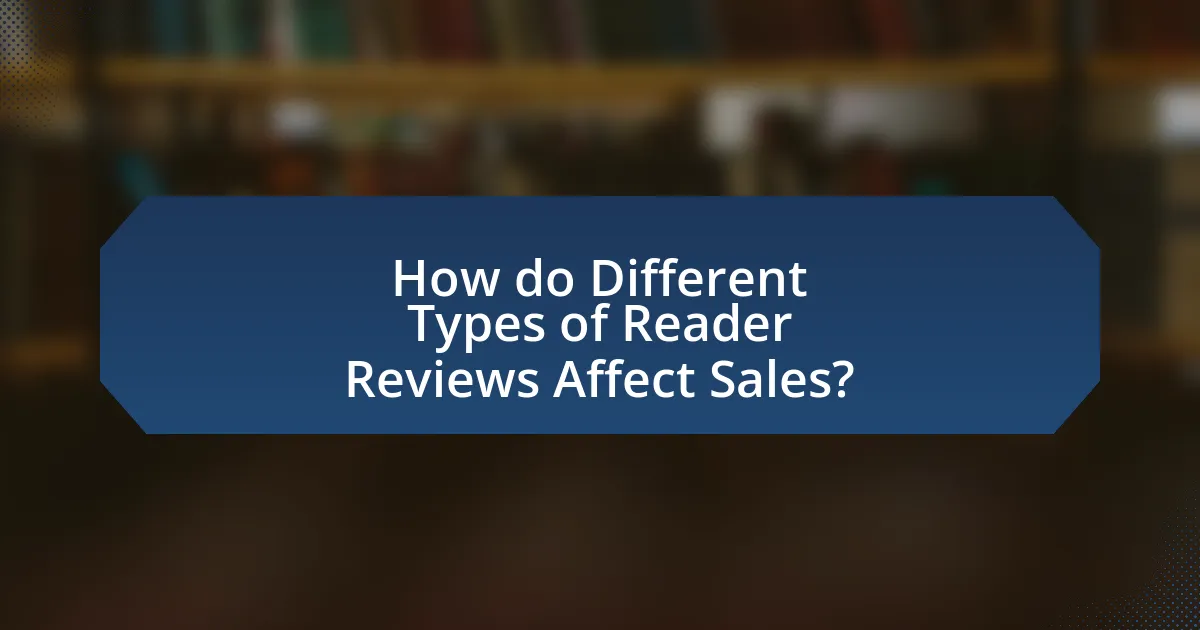
How do Different Types of Reader Reviews Affect Sales?
Different types of reader reviews significantly affect sales by influencing potential buyers’ perceptions and decisions. Positive reviews enhance credibility and attract more customers, as studies show that 70% of consumers trust online reviews as much as personal recommendations. Conversely, negative reviews can deter purchases; research indicates that one negative review can result in a 22% decrease in sales. Additionally, detailed reviews that provide specific insights about the book’s content tend to engage readers more effectively, leading to higher conversion rates. Thus, the nature and tone of reader reviews play a crucial role in shaping sales outcomes in independent publishing.
What are the various types of reader reviews available?
The various types of reader reviews available include star ratings, written reviews, video reviews, and social media reviews. Star ratings provide a quick assessment of a book’s quality, typically on a scale from one to five stars. Written reviews offer detailed opinions and insights about the book’s content, style, and impact, often found on platforms like Goodreads and Amazon. Video reviews, commonly shared on YouTube, allow reviewers to express their thoughts visually and engage with their audience more dynamically. Social media reviews occur on platforms like Twitter and Instagram, where readers share their impressions in brief posts or stories. Each type of review plays a significant role in influencing potential buyers and shaping sales trends in independent publishing.
How do star ratings compare to written reviews in influencing sales?
Star ratings significantly influence sales more than written reviews. Research indicates that products with higher star ratings tend to have increased sales, as consumers often rely on these ratings for quick assessments of quality. A study by the Harvard Business School found that a one-star increase in Yelp ratings can lead to a 5-9% increase in revenue for restaurants, demonstrating the direct correlation between star ratings and sales performance. In contrast, while written reviews provide detailed insights and can enhance consumer trust, their impact is generally secondary to the immediate visual appeal of star ratings.
What is the significance of verified purchase reviews in sales performance?
Verified purchase reviews significantly enhance sales performance by increasing consumer trust and influencing purchasing decisions. Research indicates that products with verified purchase reviews experience a higher conversion rate, as these reviews provide authenticity and credibility that potential buyers seek. For instance, a study by Spiegel Research Center found that displaying reviews can increase conversion rates by 270%, demonstrating the direct impact of verified reviews on sales. Additionally, verified purchase reviews often lead to improved product rankings on e-commerce platforms, further driving visibility and sales.
How do qualitative aspects of reviews impact sales?
Qualitative aspects of reviews significantly impact sales by influencing consumer perceptions and purchasing decisions. Positive qualitative reviews, which highlight specific features such as product quality, customer service, and user experience, can enhance a product’s credibility and desirability. For instance, a study by Chevalier and Mayzlin (2006) found that a one-star increase in ratings on platforms like Amazon can lead to a 5-10% increase in sales. Furthermore, qualitative feedback that addresses potential concerns or provides detailed insights can reduce buyer hesitation, thereby increasing conversion rates. Overall, the qualitative nature of reviews shapes consumer trust and ultimately drives sales performance.
What specific phrases or keywords in reviews correlate with higher sales?
Phrases such as “highly recommend,” “life-changing,” and “best purchase” correlate with higher sales in reviews. These keywords indicate strong positive sentiment and satisfaction, which influence potential buyers’ decisions. Research by the Harvard Business Review found that products with positive reviews containing these phrases saw a sales increase of up to 20%. Additionally, keywords related to specific benefits, such as “easy to use” or “great value,” also contribute to higher sales by addressing consumer needs directly.
How does the length of a review affect its influence on potential buyers?
The length of a review significantly affects its influence on potential buyers, with longer reviews generally perceived as more credible and informative. Research indicates that consumers often associate detailed reviews with thorough evaluations, leading to increased trust and likelihood of purchase. For instance, a study published in the Journal of Consumer Research found that reviews exceeding 200 words were more likely to be considered helpful by readers, thereby enhancing their purchasing decisions. This correlation suggests that the depth of information provided in longer reviews can effectively sway potential buyers by addressing their concerns and providing comprehensive insights.
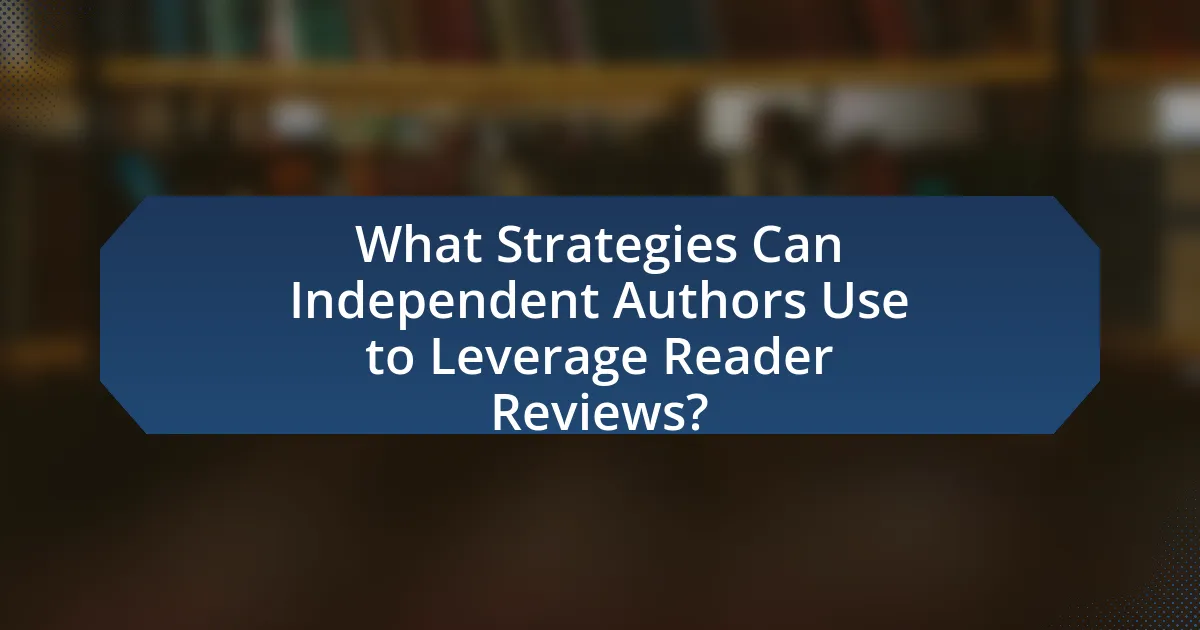
What Strategies Can Independent Authors Use to Leverage Reader Reviews?
Independent authors can leverage reader reviews by actively encouraging feedback, utilizing reviews in marketing materials, and engaging with readers. Encouraging feedback can be achieved by requesting reviews at the end of a book or through follow-up emails, which increases the likelihood of receiving more reviews. Utilizing positive reviews in marketing materials, such as on social media or book covers, can enhance credibility and attract new readers. Engaging with readers by responding to reviews fosters a sense of community and encourages further interaction, which can lead to increased sales. Research indicates that books with more reviews tend to have higher sales, demonstrating the direct impact of reader feedback on purchasing decisions.
How can authors encourage more reader reviews?
Authors can encourage more reader reviews by actively engaging with their audience and making the review process easy and appealing. Strategies include requesting reviews directly at the end of their books, utilizing social media platforms to remind readers to share their thoughts, and offering incentives such as giveaways or exclusive content for those who leave a review. Research indicates that personalized requests can significantly increase the likelihood of receiving reviews, as readers often respond positively to direct engagement from authors. Additionally, simplifying the review process by providing clear instructions on how to leave a review can further enhance participation.
What are effective methods for soliciting reviews from readers?
Effective methods for soliciting reviews from readers include directly asking for feedback, providing incentives, and utilizing social media platforms. Authors can request reviews at the end of their books, in newsletters, or through personal outreach, which has been shown to increase response rates. Offering incentives, such as discounts on future purchases or entry into a giveaway, can motivate readers to leave reviews. Additionally, leveraging social media allows authors to engage with their audience and remind them to share their thoughts, as studies indicate that social media interactions can lead to higher review rates.
How can authors utilize social media to promote reader engagement and reviews?
Authors can utilize social media to promote reader engagement and reviews by actively interacting with their audience and sharing content that encourages discussion. Engaging with readers through comments, polls, and live Q&A sessions fosters a sense of community and invites feedback. For instance, a study by the Pew Research Center found that 69% of adults in the U.S. use social media, making it an effective platform for authors to reach potential readers. Additionally, authors can incentivize reviews by hosting giveaways or offering exclusive content to those who share their thoughts on the book. This strategy not only increases the likelihood of receiving reviews but also enhances visibility, as social media algorithms often favor content with higher engagement rates.
What best practices should authors follow when responding to reviews?
Authors should respond to reviews by acknowledging the feedback, whether positive or negative, and expressing gratitude for the reader’s time and insights. This practice fosters a positive relationship with readers and demonstrates professionalism. For instance, responding to a positive review can reinforce the author’s connection with their audience, while addressing negative feedback constructively can show potential readers that the author values improvement and reader satisfaction. Research indicates that authors who engage with their audience through reviews can enhance their visibility and credibility, ultimately influencing sales positively.
How can authors handle negative reviews constructively?
Authors can handle negative reviews constructively by analyzing the feedback for actionable insights. This approach allows authors to identify specific areas for improvement in their writing, such as character development or pacing, which can enhance future works. Research indicates that authors who engage with constructive criticism often see improved reader satisfaction and increased sales, as they adapt their writing to better meet audience expectations. For instance, a study published in the Journal of Business Research found that authors who respond positively to feedback can foster a loyal reader base, ultimately leading to higher sales in subsequent publications.
What are the benefits of engaging with positive reviews?
Engaging with positive reviews enhances customer trust and loyalty. When businesses respond to positive feedback, they demonstrate appreciation for their customers, which fosters a sense of community and encourages repeat purchases. According to a study by BrightLocal, 91% of consumers read online reviews, and 84% trust them as much as personal recommendations. This indicates that actively engaging with positive reviews can significantly influence potential customers’ purchasing decisions, ultimately driving sales in independent publishing.
What practical tips can authors implement to maximize the influence of reader reviews on sales?
Authors can maximize the influence of reader reviews on sales by actively encouraging readers to leave reviews and strategically utilizing those reviews in marketing efforts. Engaging with readers through social media and email newsletters can prompt them to share their thoughts, increasing the volume of reviews. Additionally, authors should highlight positive reviews in promotional materials, such as on book covers or in advertisements, as studies show that 70% of consumers trust online reviews as much as personal recommendations. Furthermore, responding to reviews, both positive and negative, demonstrates engagement and can foster a community around the book, which can lead to increased sales.
